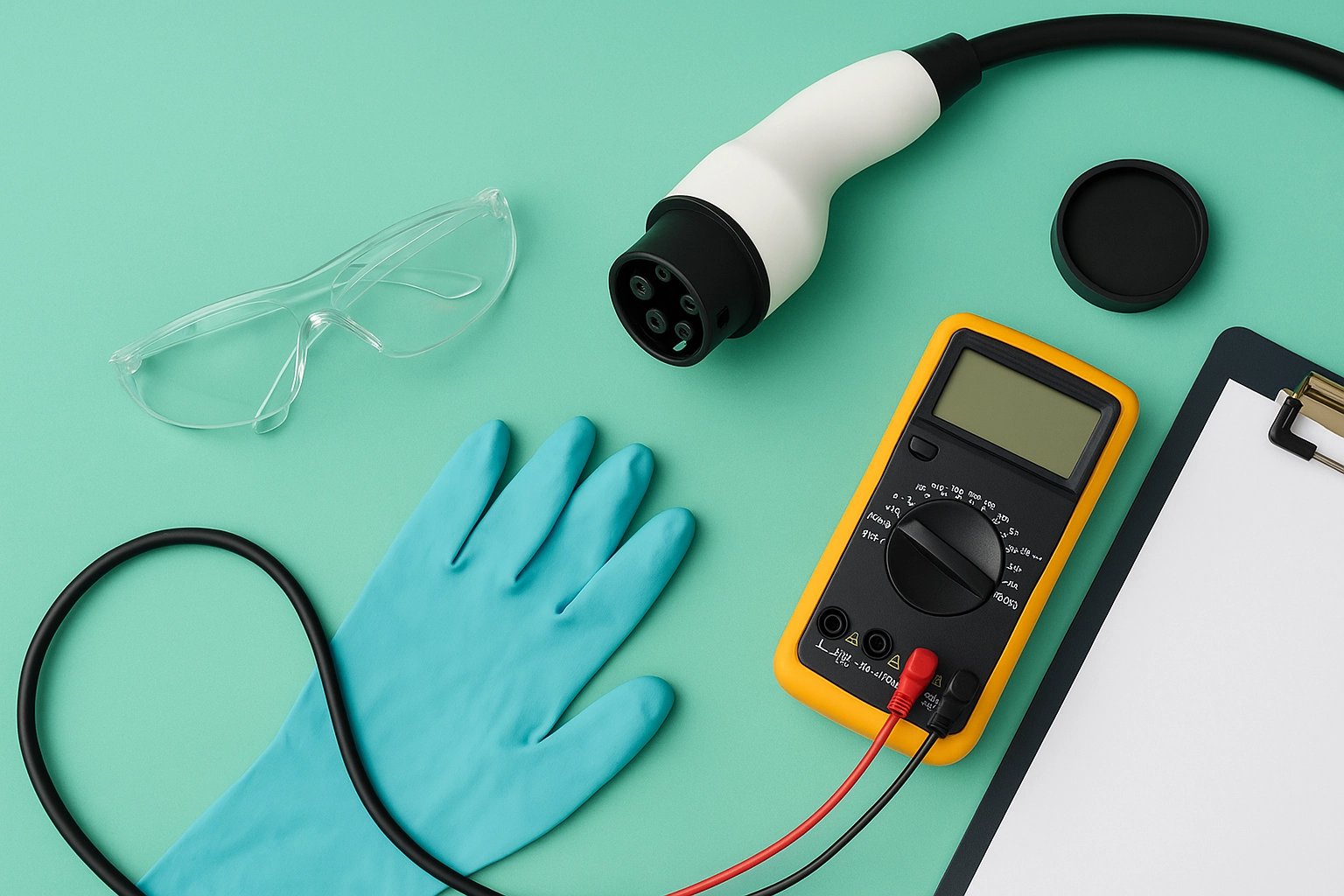NEMA EVSE 1 EV Supply Equipment Standard Testing
The National Electrical Manufacturers Association (NEMA) standard EVSE 1, titled "Plug-in Electric Vehicle Conducted Charging System," establishes specifications and requirements for electric vehicle supply equipment (EVSE), commonly known as charging stations. This service ensures that the EVSE being tested adheres to these stringent standards, guaranteeing safe and reliable operation in both residential and commercial settings.
The NEMA EVSE 1 standard is crucial for several reasons. It defines not only the physical connection between the vehicle and the charger but also sets out criteria for safety, performance, and durability. Compliance with this standard ensures that charging stations are compatible across different models of electric vehicles (EVs), which is essential as the global market for EVs continues to grow.
Compliance with NEMA standards is particularly important in industries where reliability and safety are paramount. For instance, public transportation fleets, utilities, and large-scale infrastructure projects all benefit from ensuring that their charging stations meet these rigorous requirements. This service not only verifies compliance but also enhances the reputation of manufacturers by demonstrating adherence to best practices.
The testing process involves several key steps:
- Initial Inspection: The equipment is visually inspected for any visible damage or defects that could affect its performance.
- Functional Testing: This includes checking the charging interface, ensuring correct polarity and voltage levels. We also perform load testing to determine how efficiently the charger can handle current demands.
- Safety Checks: Safety is paramount in EVSE, so we test for overcurrent protection, ground fault detection, and other safety features that prevent hazards such as short circuits or electrical fires.
- Compatibility Testing: Ensuring compatibility with various EV models enhances user experience and extends the charger’s marketability.
- Reporting: Upon successful completion of all tests, we provide a comprehensive report detailing the results. This includes detailed information about any discrepancies found during testing along with recommendations for corrective actions.
The NEMA EVSE 1 standard is widely recognized and used globally in countries that have adopted it as part of their infrastructure development plans. By adhering to this standard, manufacturers ensure that their products meet international safety standards, thereby fostering trust among consumers and regulatory bodies.
| Applied Standards | Description |
|---|---|
| NEMA EVSE 1-2021 | This standard specifies the requirements for plug-in electric vehicle conductors and connectors, including the conductive charging interface between a plug-in electric vehicle (PEV) and an off-board charging source. |
| ISO/IEC 61851-20 | This international standard covers the communication protocols used in EVSE, ensuring seamless interaction with various models of electric vehicles. |
| ASTM F2739 | American Society for Testing and Materials standards that provide additional requirements for safety and durability testing. |
By offering this service, we ensure that manufacturers are compliant with not only the NEMA EVSE 1 standard but also other relevant international standards such as ISO/IEC 61851-20 and ASTM F2739. This comprehensive approach guarantees that our clients can confidently deploy their charging stations knowing they meet all necessary requirements.
Why It Matters
The importance of NEMA EVSE 1 compliance cannot be overstated, especially as the adoption of electric vehicles continues to rise. Here are some key reasons why adherence to this standard is crucial:
- Safety First: The NEMA standards prioritize safety above all else by mandating robust protective measures against overcurrents and ground faults.
- Interoperability: Ensuring that charging stations are compatible with a wide range of EV models enhances the overall user experience, making it easier for consumers to switch between brands without worrying about compatibility issues.
- Market Acceptance: Compliance signals to potential customers and regulatory bodies that your product meets the highest standards in the industry, which is particularly important given the growing scrutiny on sustainability and safety in electric vehicle infrastructure.
- Longevity and Reliability: The rigorous testing ensures that the equipment not only works correctly during installation but also maintains its performance over time, reducing maintenance costs and downtime.
In conclusion, NEMA EVSE 1 compliance is essential for any manufacturer looking to produce reliable, safe, and interoperable charging stations. By adhering to these standards, you can ensure that your products meet the highest industry benchmarks, thereby enhancing both safety and market appeal.
Applied Standards
| Applied Standards | Description |
|---|---|
| NEMA EVSE 1-2021 | This standard specifies the requirements for plug-in electric vehicle conductors and connectors, including the conductive charging interface between a plug-in electric vehicle (PEV) and an off-board charging source. |
| ISO/IEC 61851-20 | This international standard covers the communication protocols used in EVSE, ensuring seamless interaction with various models of electric vehicles. |
| ASTM F2739 | American Society for Testing and Materials standards that provide additional requirements for safety and durability testing. |
These standards are integral to ensuring that the EVSE being tested meets all necessary criteria, from physical specifications to communication protocols. Compliance with these standards guarantees reliability, safety, and interoperability across different models of electric vehicles.
Environmental and Sustainability Contributions
- Emissions Reduction: By promoting the use of renewable energy sources through EVSE testing, we contribute to reducing greenhouse gas emissions associated with fossil fuel consumption.
- Sustainable Infrastructure: Ensuring that charging stations are reliable and safe helps in the development of a robust electric vehicle infrastructure, which is crucial for the transition to a more sustainable future.
Testing EVSE against these standards not only ensures compliance with international regulations but also plays a pivotal role in advancing environmental sustainability. By supporting this initiative, we contribute to reducing carbon footprints and promoting cleaner energy usage.





